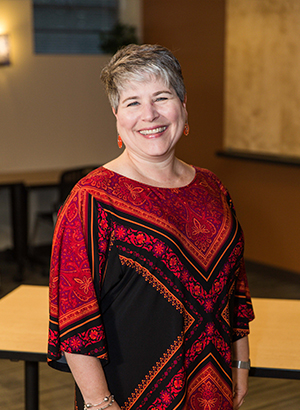 by Julie Koegel
by Julie Koegel
grants officer for Women’s Fund of Central Indiana
This story contains discussion of suicide. If you or someone you know may be struggling with suicidal thoughts, call the suicide prevention hotline at 1.800.273.8255, text TALK to 741741 to text a trained crisis counselor for free 24/7, or seek out local resources.
Women’s Fund of Central has passionately increased its commitment to changing the conversation around mental health over the past two years. In 2017, Women’s Fund convened community partners to join the national Campaign to Change Direction on mental health, which began by encouraging everyone, especially residents in Central Indiana, to recognize and respond to the five signs of emotional suffering—personality change, agitation, withdrawal, poor self-care and hopelessness.
Additionally, Women’s Fund is supporting the launch of a Give an Hour office in Indianapolis in 2019 that will offer one-on-one mental health counseling for marginalized women and girls. And, as a result of funds raised and donated from “A Moderated Conversation with Former First Lady Michelle Obama” earlier this year, Women’s Fund is awarding a $750,000 grant to a local organization creating a disruptive and transformational way to provide mental health services to girls. That grant announcement will come in 2019.
Mental well-being has become a significant initiative of Women’s Fund and it touches everything we do. Just last month, Women’s Fund hosted a group of donors for an event about mental health, specifically as it relates to suicide and its impact in our community. Did you know:
- Suicide is the 10th leading cause of death in Indiana.
- One individual dies by suicide every eight hours in Indiana.
- Suicide is the second leading cause of death among individuals 15-34 in Indiana.
At the event, Kelsey Steuer, Indiana area director of American Foundation for Suicide Prevention, and Mike Riekhof, founder of The Peyton Riekhof Foundation for Youth Hope shared their personal stories of losing family members to suicide. It was a valuable conversation and I was struck by a number of their comments, such as:
- “You can’t see the person’s pain on the outside.”
- “I felt guilty enjoying holidays, spaces and places because my loved one can’t be there.”
- “I thought I was being strong by being silent.”
- “It is important to talk to people you care about and ask them if they are okay.”
- “It is often hard to tell the difference between normal teen behavior and mental health issues.”
- “It is not a failure to ask for help.”
- “Timing matters – an intense suicidal urge is usually short; it is a mixture of desire to live versus a desire to die/escape pain.”
- “We need to talk about mental health as health.”
The conversation also introduced a warning signs, including if a person talks about killing themselves, feeling hopeless or being a burden to others. American Foundation for Suicide Prevention lists several suicide risk factors to be aware of in yourself or others related to health, environment and historical factors, as well as mood and behavior indicators. A full list of warning signs and risk factors can be found at their website.
It’s important for everyone to be able to recognize and respond to these signs, and the signs of mental distress. If you think someone is considering suicide, assume you are the only one who will reach out.
Here is how to talk to someone who may be struggling with their mental health:
- talk to them in private
- listen to their story
- tell them you care about them
- ask directly if they are thinking about suicide
- encourage them to seek treatment or contact their doctor or therapist
- avoid debating the value of life, minimizing their problems or giving advice
If a person says they are considering suicide:
- take them seriously
- stay with them
- help them remove lethal means
- call the National Suicide Prevention Lifeline at 1.800.273.8255
- text TALK to 741741 to text with a trained crisis counselor for free 24/7
- escort them to mental health services or an emergency room
Most people are familiar with the signs of a heart attack; Women’s Fund believes the ability to recognize and respond to the signs of mental distress are just as life changing. Our goal is to normalize conversations about mental health because your mental well-being is too important for it to be any other way.






Leave A Comment